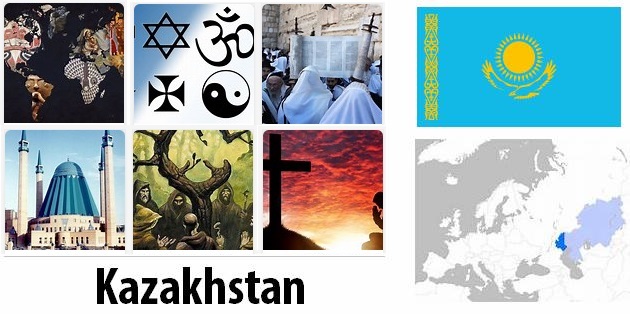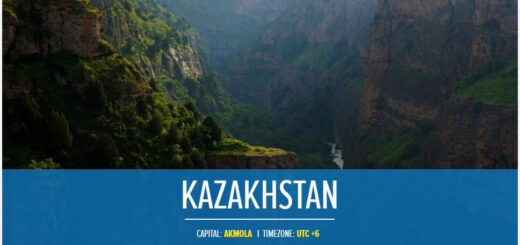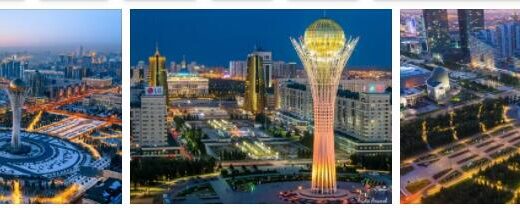Kazakhstan Religion
A large majority of the population of Kazakhstan are Sunni Muslims, while upwards of a quarter of the residents belong to the Russian Orthodox Church. According to the Constitution, Kazakhstan is a secular state that guarantees religious freedom, but in reality there are restrictions on freedom.
A law on the registration of religious groups was tightened in 2011, causing around one-third of previously accepted communities to become illegal. Some smaller groups, both Muslim and Christian, are denied registration. Some harassment has been reported by Jehovah’s Witnesses and Hare Krishna, among others.
Authorities are reported to oversee religious activities. Anti-terrorism police have raided meetings in private homes, forced believers into psychiatric treatment and fined people for reading holy scriptures or praying. The authorities reserve the right to check religious literature before it is imported.
Behind this is a concern that political and religious extremism will take root in the country. The Islamist group Hizb ut-Tahrir is banned. The group advocates an Islamic state in Central Asia. Radical Islamists, however, have relatively few followers in Kazakhstan.
Islam has been around for a long time in the region. One of the most famous Sufis (Muslim mystics) of the Turkish-Muslim world is the sainted poet Ahmad Yasavi (dead 1166) who grew up in the city of Turkestan in southern Kazakhstan and is buried there. Even among the nomadic population, there were early Muslims, especially in the aristocracy. But it was not until the 18th and 19th centuries that Tatar missionaries from Russia, with the good memory of the Tsar, spread Islam among the Kazakh people’s wide stock. It was then about liberal forms of Sunni Islam. Kazakh women have not had to wear a veil. Above all, among the Northern Kazakhs, today, under the Islamic surface, remains of ancient religious beliefs remain.
As a result of the immigration of many Russians and Ukrainians, the Orthodox Church alongside Islam is the most important community. There are also Catholics, Jews and other religious minorities in the country, but these have decreased as a result of emigration.
During the Soviet era (1920–1991), the state propagated to atheism, and believers from all societies were oppressed and discriminated against. After independence, the religious communities have been given a new role, among other things by helping vulnerable groups in society. In this area there is cooperation between Muslim and Christian communities. New churches and, above all, mosques have also been erected.
- Countryaah: Population statistics for 2020 and next 30 years in Kazakhstan, covering demographics, population graphs, and official data for growth rates, population density, and death rates.
Population composition
The population is made up of 48% Kazakhs and 35% Russians. The Ukrainians, Germans, Uzbeks and Tatars make up a small proportion. Due to the emigration of Russian-speaking residents, the population of Kazakhstan decreased by 1.25 million between 1989 and 1999. The number of Germans fell sharply after 1989 due to the emigration of many ethnic German repatriates to Germany.
Population distribution
The population distribution in the country is very different. The most densely populated are the agriculturally used steppe areas in the north as well as the industrial areas and the irrigation areas in the southern foothills. Large parts of the country are barely or not at all inhabited. The urbanization has progressed. Around two thirds of the population live in cities.
Religion
The Kazakhs, Tatars, Uyghurs and other Turkic-speaking peoples profess Islam. The Russians belong to the Russian Orthodox Church. The majority of Germans belong to the Catholic and Evangelical Lutheran Churches.
2016
December
Prison for separatism
December 5
A man sentenced to 5.5 years in prison for separatism after propagating on the Internet for Kazakhstan to become part of Russia. Since 2015, at least four similar convictions for separatism have been handed down. Northern Kazakhstan borders Russia and has a large dominance of ethnic Russians and Russian-speaking Kazakhs in the population. The government is concerned that Russia will use pro-Russian sentiments in northern Kazakhstan to create a situation similar to that of Ukraine, where Russia annexed the Ukrainian peninsula of Crimea in March 2014 and subsequently provided military support to separatists in eastern Ukraine.
November
Tough punishment for terrorism
November 28
Seven men are sentenced to life imprisonment and two to prison for 20-25 years for the armed attacks in the city of Aqtöbe in June 2016, when four civilians and three soldiers were killed. Twenty people are sentenced to prison for between 2 and 5 years for not reporting that they knew that terrorist acts were planned or for protecting terrorists. According to President Nazarbayev, the terrorists were part of the strict Salafist branch of Islam.
Parliament wants to change the name of the capital
November 23
Parliament voted unanimously to rename the capital Astana and name it after President Nazarbayev. The decision is seen as part of the cult of personality that is being built around the president. Recently it was announced that new banknotes with Nazarbayev’s portraits will start to circulate. The president comments on the proposal to rename the capital by saying “it is not necessary”.
Prison for attempting to overthrow the government
November 7
The head of a brewery is sentenced to 21 years in prison for extremism, illegal weapons possession and attempts to overthrow the government. A number of co-accused are sentenced to prison or prison work of varying length. The brewery manager is also charged with having financed protests against the privatization of agricultural land earlier this year.
October
Terrorist trial begins in Aqtöbe
October 18
In the city of Aqtöbe, a mass trial is being launched against suspected Islamist terrorists (see June 2016). Nine of them are charged with terrorism, murder, participation in a terrorist organization and illegal possession of weapons. Eighteen people are charged with failing to notify police that terrorist acts were planned, and two are accused of protecting criminals.
The Journalist Association chairman is imprisoned
October 3
Seitqazy Matayev, president of the Kazakh Journalist Association, is sentenced to six years in prison for tax offenses and misdemeanors. His son Aset, head of the KazTag news agency, is sentenced to five years in prison. Both deny crime and human rights organizations say that the men were prosecuted because of their journalistic activities.
September
President’s daughter gets top posts
September 16th
President Nazarbayev’s daughter Darigha Nazarbajeva is elected chairman of the Senate Foreign Affairs, Defense and Security Committee, just days after she was awarded a seat in the Senate.
The Prime Minister is dismissed
September 8
President Nazarbayev dismisses Prime Minister Mäsimov and appoints him as head of the security service KNB. New Prime Minister will be Baqytzjan Saghyntajev, who was previously governor of the Pavlodar region, Deputy Chairman of the Government Party of the Fatherland, the Minister of Trade and Development, and since 2013 Deputy Prime Minister.
August
Opposition politician is released
August 19th
Vladimir Kozlov, leader of the banned opposition party Alga, is released conditionally after being jailed since 2012 for rioting. He was convicted of lying behind an oil worker strike in 2011 that ended with at least 15 people being shot dead by soldiers.
Land sales are postponed for five years
August 18th
President Nazarbayev orders that the planned privatization of agricultural land be postponed for five years, until December 2021.
July
Deadly attack on police station
July 18
At least three policemen and a civilian are killed when a police station and a building belonging to the security service in Almaty are attacked. According to an employee at the city’s leading hospital, four police officers, a civilian and an attacker have been killed. The motives for the attacks are not known, but the suspicions are directed at Islamic extremists.
June
“The assailants were salafists”
June 12
The security service says that all perpetrators with links to the attacks in Aqtöbe have been arrested or “neutralized”. According to President Nazarbayev, the perpetrators were Salafists, that is, supporters of an ultra-conservative movement within Islam.
Nineteen dead in attacks in Aqtöbe
June 5
Nineteen people are killed in clashes with police after suspected Islamist extremists attack two arms deals and a base for the National Guard in the city of Aqtöbe, about 10 miles from the Russian border in northwestern Kazakhstan. Most of the dead are assailants. Two men are arrested and in a subsequent pursuit of the perpetrators, the police kill 13 people. President Nazarbayev says that those behind the deed have received instructions from “abroad”. He demands that those arrested be sentenced to “the most severe punishment in the law”.
May
Police turn down protests
May 21
Dozens of people are arrested by the police as they try to hold a demonstration against the government’s plans to lease farmland to foreign companies. All major public places are blocked off to make it difficult for new protests.
Police councils ahead of planned protests
May 17
Dozens of people are arrested and sentenced to prison for a couple of weeks as police make raids around the country in anticipation of planned protests against the government’s sale of agricultural land. Among other things, it should be possible for foreign citizens and companies to lease land for up to 25 years. The critics fear that the sale of land will take place without public scrutiny and that it can therefore lead to corruption.
The Minister of Finance leaves his post
May 6
As a result of the popular protests against the new Land Sale Act, Finance Minister Jerbolat Dosayev is forced to resign. President Nazarbayev criticizes the finance minister for failing to explain the new law to the Kazakhs and he is appointing a group to review the law before it enters into force, probably only in 2017.
April
Demonstration against the sale of land
April 24
Around 2,000 protesters gather in an illegal protest action on the central square of the city of Atyrau in the oil-rich western part of the country. The protesters oppose a new law that comes into force on July 1 and makes it possible to sell agricultural land to foreign persons and companies. The demonstration will be peaceful.
March
The government unchanged after the election
March 25th
Parliament gives Prime Minister Kärim Mäsimov and his government confidence in a formal vote. Thus, the government remains unchanged following the great election victory of the ruling Fatherland.
Parliamentary election with sure victory
March 20
President’s Party The Fatherland candle gets 82 percent of the vote in the parliamentary elections. The People’s Communist Party and The Bright Way also manage the seven percent block and take their seats in parliament. OSCE observers say that Kazakhstan has a long way to go before it fulfills its promises to hold democratic elections.
February
Opposition parties are allowed to take part in the elections
February 12
The Central Election Commission approves the candidate list submitted by the National Social Democratic Party (NSDP). The NSDP (see Political system) is considered the only genuine opposition party in the country.
January
New elections are announced
January 20th
President Nazarbayev dissolves parliament and announces new elections until March 20. The elections had been expected by the end of the year or early 2017. Nazarbayev is believed to have confirmed by his earlier statement his grip on Parliament before the country’s deteriorating economy had led to widespread dissatisfaction. The President already has total support among the 107 members.




